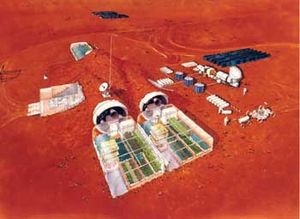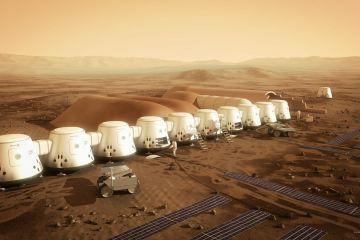Settlement
Settlements on Mars are planned to be a permanent habitat for human beings. The Mars Foundation™ is developing detailed plans for a Hillside settlement and a Plains settlement.
Additionally, a volcanic cave settlement and a multi-layered vault settlement using Universal bricks are possible.
The use of the word "Settlement" is proposed over the use of "Colony" as colony usually implies there is a formal link between the establishment and an original state.
Contents
Types of Bases
- Early exploration bases are relatively primitive and intended for short term stays of 18 months or so. (The duration of a Conjunction class mission. See also Mars Direct.)
- Emergency bases are locations with little more than some supplies and moth balled life support, used to help people in an emergency. Early exploration bases may be converted into these.
- Resource extraction sites. These bases are located near a valuable resource. The amount of time spend improving them would depend on how long it will take to extract the resource.
- Towns and cities. These are large, long term bases with signifiant thought put into Radiation shielding, and protecting people from Mars' Low gravity.
Location considerations
- Early exploration settlements would wish to be within a reasonable travel time of scientifically interesting sites.
- Natural resources should be nearby to avoid long journeys.
- Natural caves may be used for shelter or for energy storage.
- Geothermal energy may be used for heating, power, and perhaps a source of water.
- Protection from solar radiation and Cosmic Rays by mountains and lava tubes. Note that while underground settlements get less radiation, we need sunlight for greenhouse lighting.
- A source of water is very important. Water is common at high latitudes.
- As much solar heating as possible. Sunlight is more powerful at low latitudes.
- Space elevators must be on the equator. Sky ramps are most useful near the equator. Incoming space craft can reach equatorial sites while spending less delta-vee.
- Lower elevations have a more air pressure than high locations. More air helps slightly with radiation, temperature swings, and makes it easier for industry to compress air.
- The northern hemisphere has less extreme temperatures swings. See Periareion.
Why settlements on Mars?
Compared with other celestial bodies, for instance Earth's Moon, the planet Mars provides a number of advantages. The Martian surface and atmosphere consists of all necessary substances that are needed to build and maintain a human settlement, including water, carbon and minerals. The environmental conditions are quite cold, but not too cold. The distance from the sun allows solar panels to operate, which is essential for energy production. (Note: there may be geothermal power on Mars, and nuclear power can work anywhere.) The sunlight is also sufficient for plants to grow. (This is not possible beyond the asteroid belt.)
Particularly convenient is the existence of a visible sky, which can make people feel at home, and the day-night rhythm is nearly earth like. Though the gravity is lower than on Earth, it still allows people easily to walk and do exercise. The spacial orientation is supported. The comfort of sinking into a pillow for sleeping might be appreciated. And yet, there are several things, settlers would miss.
Advantage over Earth's moon
- Higher gravity (with positive consequences for health).
- Abundance of water and carbon.
- All volatile elements (such as sulphur, phosphorus, iodine, mercury, potassium, etc.) are rare on Luna.
- Geothermal power, and liquid water aquifers are possible on Mars but not on Luna.
- Mars' thin atmosphere provides radiation protection from low energy particles. (Though Mars' atmospheric pressure is 0.6% of Earth's, it provides 1.5% of Earth's atmospheric radiation protection.)
- Mars temperature is close to human tolerances during the day. On Luna, both the day and night temperatures are too extreme.
- Volcanic and hydrological processes are likely to have produced exploitable ores on Mars. The moon will likely be made up of junk rock.
- Approximately a 24 hour day / night cycle allows for crops to be grown with natural sunlight. (This is a big deal, a massive amount of light is needed for a farm.)
- Almost all areas of Luna cannot use solar power, as batteries which can last for the 14 day long night are probably too massive. Using In situ materials might change this, for example by producing methane and oxygen for energy storage.
- Mars' air can lubricate moving parts. Luna's hard vacuum can result in vacuum welding and excessive wear on machinery.
- A massive engineering effort could terraform Mars so that the air pressure would not require a space suit (only an air mask).
Advantage over Venus
- A cold environment is much easier to handle than a hot one. Especially on the planetary surface, a settlement on Venus is not possible.
- Compared with a floating settlement in the Venusian clouds, the Martian surface provides easy access to substances for construction material.
- Water is rare on Venus and is in the form of sulphuric acid.
Advantage over Jovian satellites
- Higher gravity (with consequences for health)
- Sufficient solar power to grow plants with natural sunlight.
- Soils and rocks are easily available, and not buried under kilometres of ice / water. (Exception, IO has no ice, but its constant vulcanism is a real danger.)
- Radiation levels of the four large Jovian satellites is very, very high. (On Callisto it is only high.)
Space settlements
Large rotating space settlements, such as those proposed by Gerald O'Neil have a number of advantageous characteristics that put them in competition with Mars settlements.
They can have Earth normal gravity and pressure, plenty of solar power, none of the problems of Venus. They have low deltaV requirements. However, their problem is an absolute lack of resources. The moons of Mars might offer an attractive source of elements for the construction of space settlements








